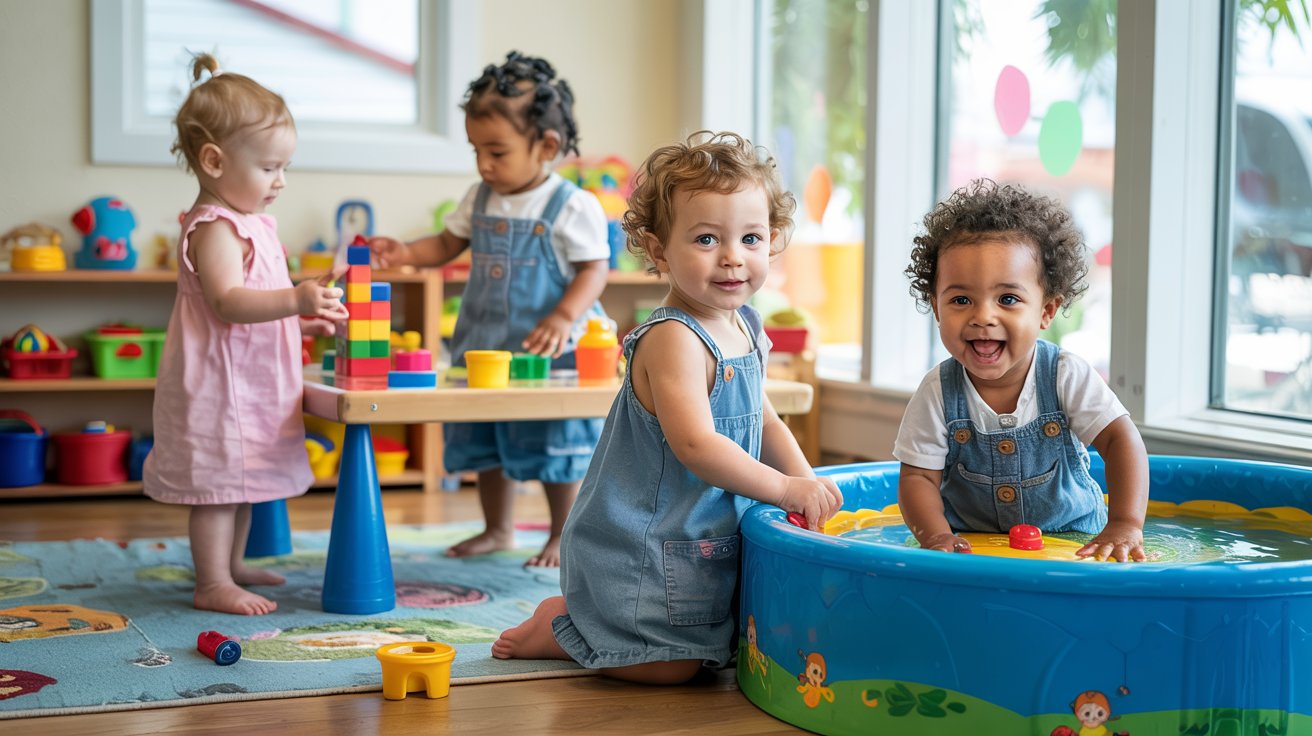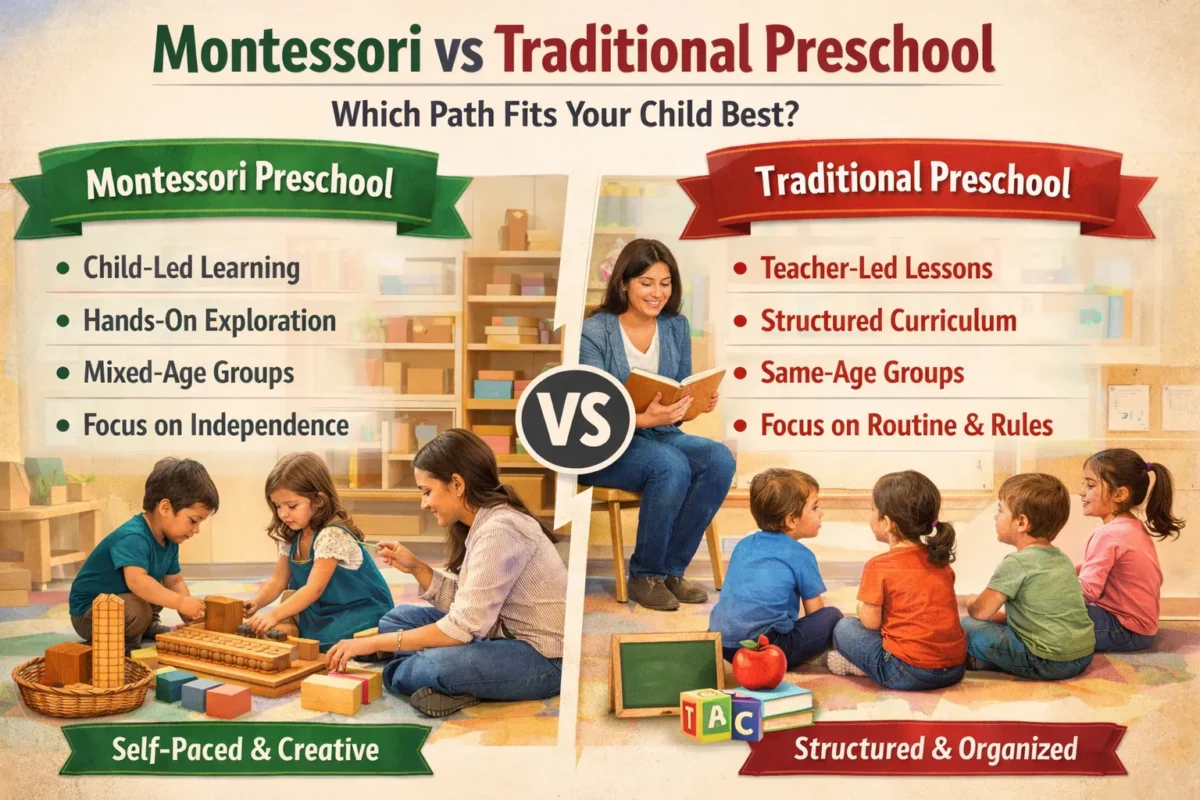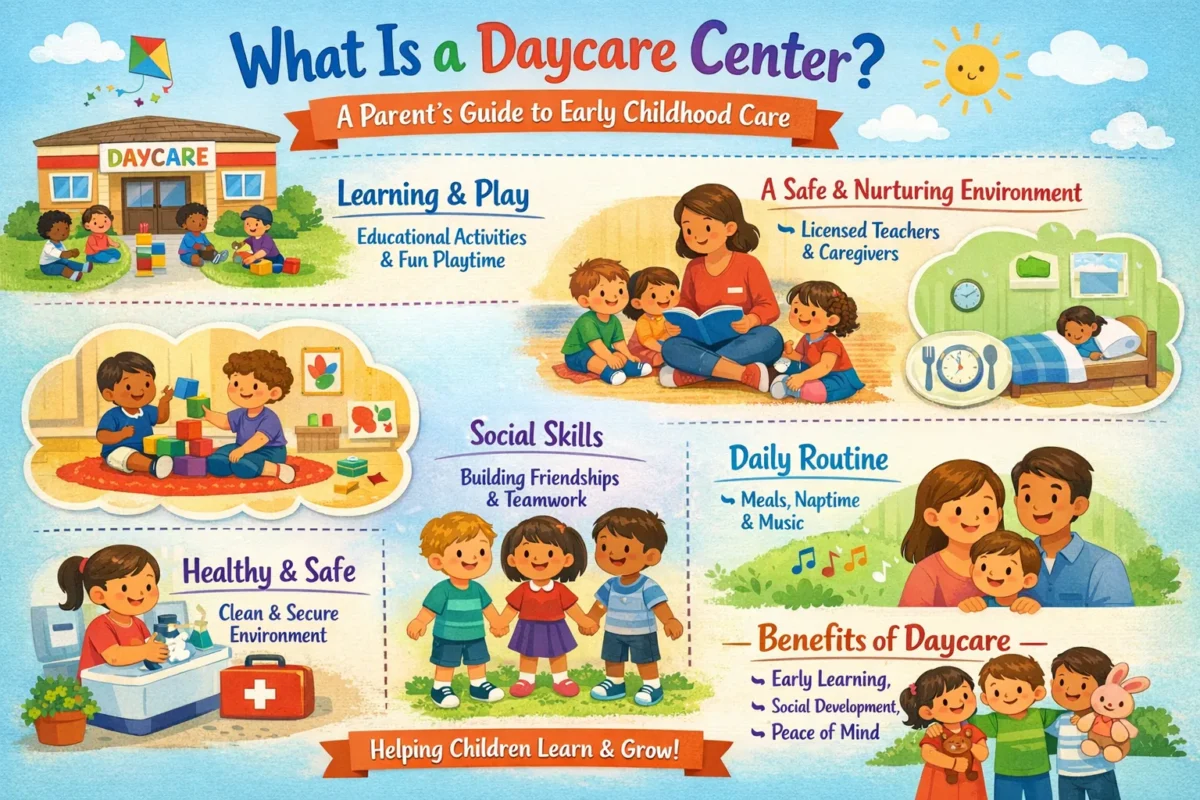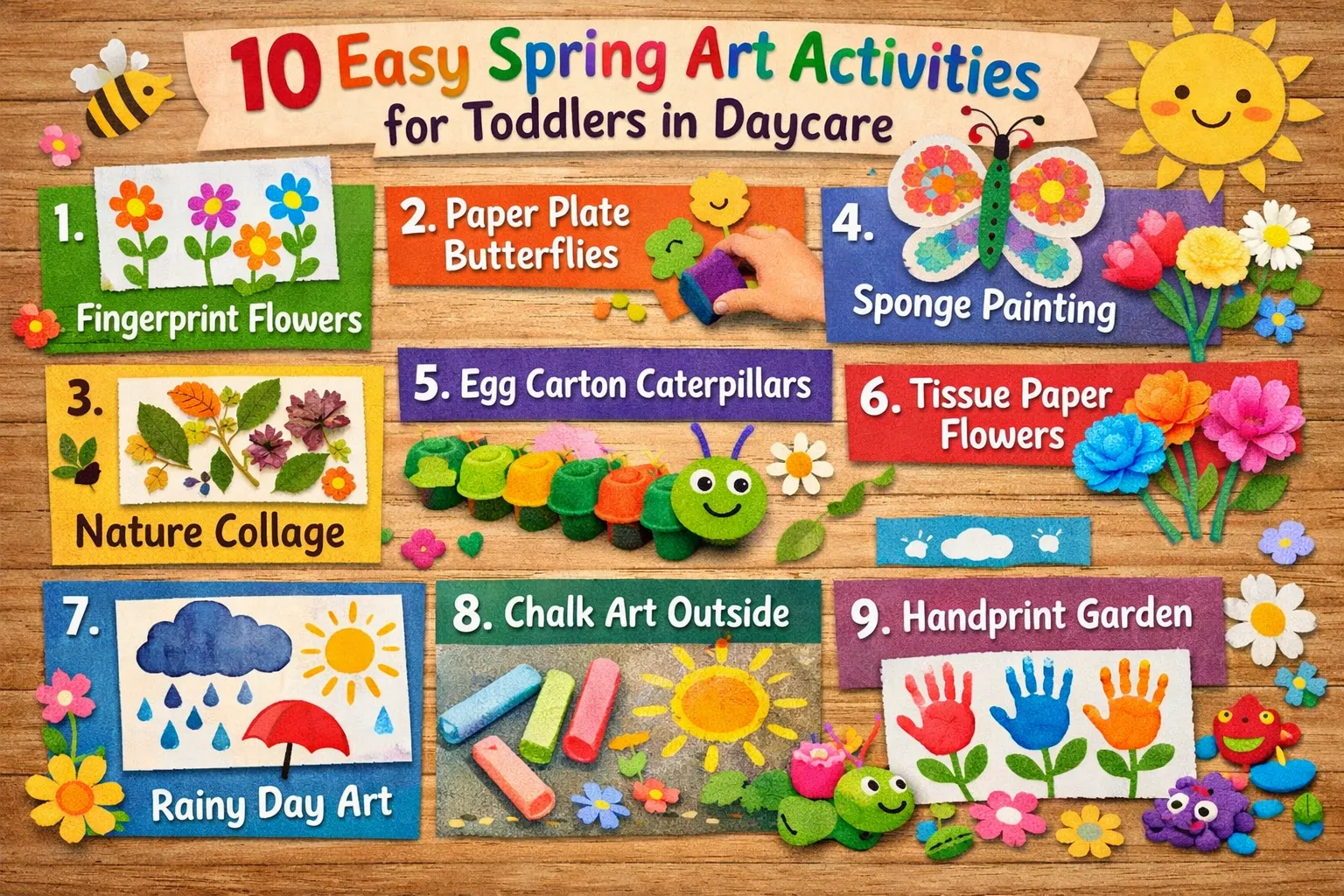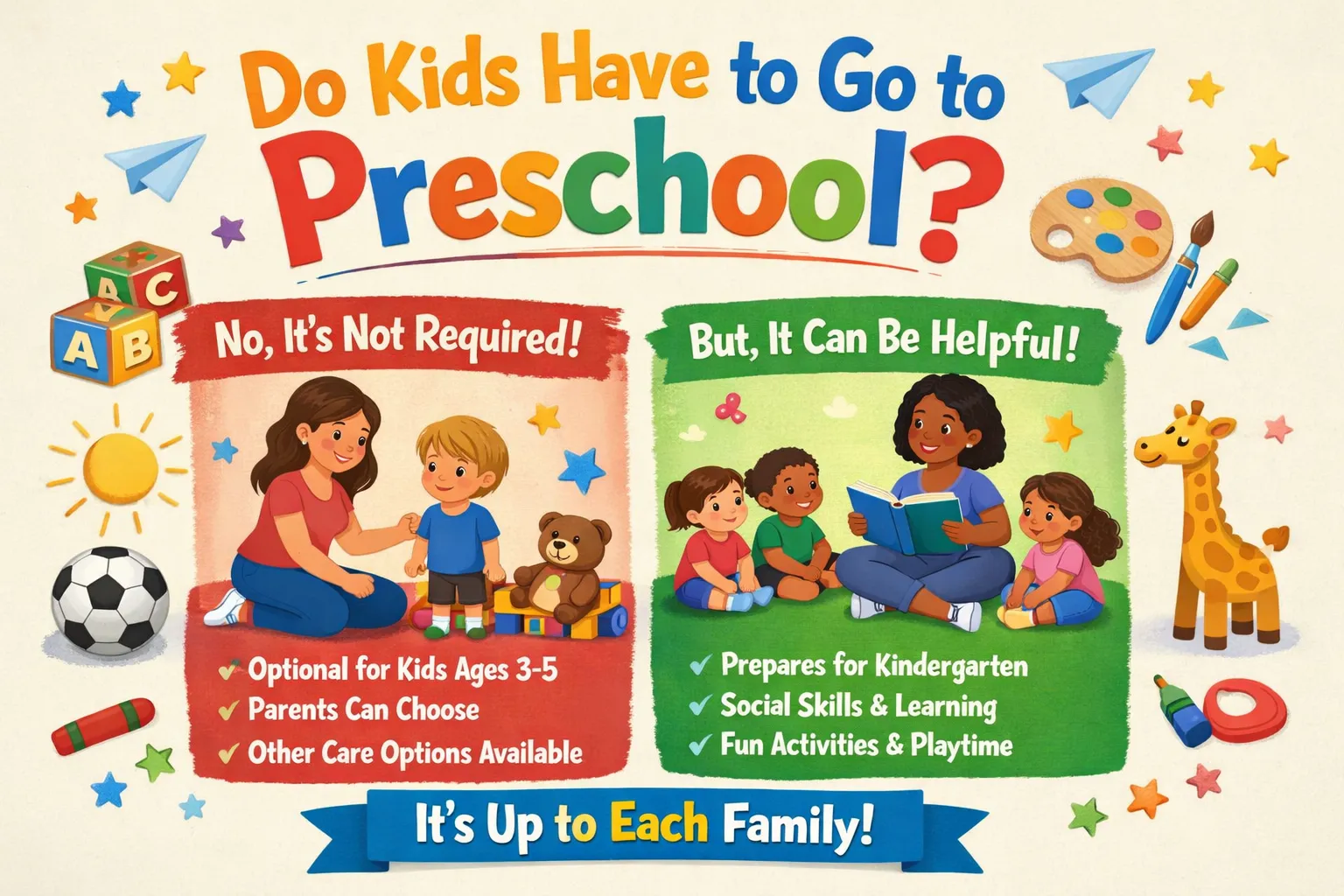Introduction
Deciding when to enroll your child in daycare is a significant milestone for any parent. It’s a choice that often comes with a mix of emotions—uncertainty, guilt, anticipation, and hope. Many parents wonder if their child is too young or if waiting too long might impact their social or learning development. The truth is, there’s no universal answer, but understanding the factors that influence a child’s readiness can help ease the decision.
In this blog, we’ll explore what experts in child development have to say about the best age to start daycare. We’ll also look at current research, real concerns many parents have, and practical guidance to help you make the most informed decision for your family. Whether you’re a first-time parent or navigating this choice again, this guide is here to support you through it.
Why Age Matters When Starting Daycare
Choosing the right age to start daycare is more than just a scheduling decision—it plays a crucial role in your child’s emotional, physical, and cognitive growth. Understanding how children develop at different stages can help parents make informed choices that align with their child’s readiness and well-being.
Emotional and Developmental Readiness
A child’s emotional development is closely tied to their ability to form secure attachments. During the first few years of life, especially from birth to around age two, children rely heavily on their primary caregivers for comfort, safety, and bonding. This early attachment lays the groundwork for future relationships and self-confidence.
Introducing daycare too early, before a child has developed a strong emotional bond with a caregiver, can sometimes lead to stress or difficulty adjusting. However, once a child begins showing signs of independence—like exploring more freely, expressing emotions clearly, or forming simple social bonds—they may be more emotionally ready to thrive in a daycare setting. Social readiness, including the ability to play alongside or with other children, is another positive sign that a child may benefit from the structure and interaction that daycare provides.
Physical and Cognitive Development
Developmental milestones also influence how smoothly a child transitions into daycare. Around the age of one, many children start walking, improving their ability to explore and engage with their environment. As they reach 18 months to 3 years, their language skills and cognitive abilities grow rapidly, making it easier for them to follow simple instructions, communicate needs, and participate in group activities.
These physical and cognitive developments support a more positive daycare experience. A child who can move independently, express basic needs, and engage with activities is more likely to adjust well and enjoy their time in a group setting. Recognizing these signs of readiness can help parents feel more confident about when to start daycare.
What Experts Say About the Ideal Starting Age
Insights from Child Psychologists
Many child psychologists agree that the best age to start daycare depends heavily on a child’s emotional development and the quality of care available. During the first year of life, babies form strong attachments to their primary caregivers. According to Dr. Laura Markham, a clinical psychologist and author at Aha! Parenting, infants under 12 months benefit most from one-on-one attention, making home care or smaller daycare settings preferable at this stage.
As children reach 18 months to 3 years, they begin developing stronger social awareness and curiosity. Experts suggest that this window can be ideal for daycare introduction—provided the environment supports secure attachment, individualized care, and age-appropriate activities.
Pediatric Research Findings
Current pediatric research also emphasizes the importance of timing. A 2016 article on Practical Research Parenting highlights that early daycare (before 12 months) may carry a slight increase in stress-related behaviors in some children, especially if caregiver responsiveness is low. However, quality care environments can significantly reduce these risks and even enhance cognitive and language development by age three.
In general, both psychological and medical experts recommend weighing your child’s temperament, your family’s needs, and the daycare setting itself before making the decision. The key is finding a balance between your child’s developmental readiness and a nurturing care environment.
Age-by-Age Guide: What to Expect at Each Stage
6 Weeks to 12 Months
Starting daycare as early as six weeks is possible, especially for working parents returning from maternity leave. At this stage, infants are highly dependent on consistent, nurturing care. One potential benefit of early daycare is that babies may adapt more easily to new routines and caregivers. Additionally, high-quality infant programs often provide rich sensory experiences and opportunities for development.
However, there are also challenges. Babies under one year old rely heavily on strong emotional bonds, usually with their primary caregivers. Some experts suggest that prolonged separation at this stage could impact attachment. Additionally, younger babies are more vulnerable to illness as their immune systems are still developing, so the daycare environment must be exceptionally clean and attentive.
1 to 2 Years Old
Between one and two years of age, children begin forming stronger attachments and becoming more aware of their surroundings. This period can bring a mix of curiosity and clinginess, making daycare transitions more emotionally challenging. Separation anxiety is common and completely normal at this age.
That said, toddlers are also beginning to explore independence. A supportive daycare can help reinforce trust and provide a structured yet nurturing environment. The key is a gentle transition, with caregivers who are trained to handle emotional ups and downs in young toddlers.
2 to 3 Years Old
This is often considered a sweet spot for starting daycare. Children at this age are becoming more social and are eager to engage with their peers. They start to thrive on routines, structured play, and new learning experiences, all of which are typically built into quality daycare programs.
By age two or three, many children are speaking in simple sentences, understanding basic instructions, and participating in group activities. A daycare setting can help strengthen these skills while also teaching patience, sharing, and cooperation. While some separation anxiety may still be present, it generally eases more quickly compared to earlier stages.
3 to 5 Years Old
From age three onward, children are usually more independent and emotionally prepared for longer periods away from home. This stage aligns well with preschool readiness, as most kids are developing self-help skills like dressing themselves, using the restroom, and following simple instructions.
Daycare at this age often shifts toward preparing children for kindergarten. Activities are more structured, with an emphasis on early literacy, problem-solving, and social interaction. Kids benefit from being in a group setting where they can build friendships, learn conflict resolution, and gain confidence in a classroom-like environment.
Signs Your Child Might Be Ready for Daycare
Deciding when your child is ready for daycare isn’t just about age—it’s about observing their behavior, emotions, and how they relate to you and others. While every child is unique, there are some common signs that may indicate your little one is prepared to start this new chapter.
Behavioral and Emotional Indicators
One of the first things parents notice is a growing sense of independence. If your child is starting to explore more confidently, shows curiosity about their surroundings, or can play alone for short periods, these may be signs of emotional readiness. Children who express themselves—whether through words, gestures, or play—often adapt more easily to a group setting where communication is key.
Additionally, if your child begins to show interest in other kids, even just by watching or smiling at them during playtime at the park, it can be a sign that they’re ready to socialize in a daycare environment. Comfort with routines, such as eating or napping at regular times, is another helpful indicator.
Parent-Child Interaction Cues
How your child handles brief separations from you can also offer insight. If they’re able to say goodbye without extreme distress or can be comforted by another trusted adult, that’s a positive sign. This doesn’t mean they won’t miss you, but it shows they’re starting to build the confidence to be away from you for a few hours.
You may also notice your child mimicking your behaviors or responding positively to simple instructions. These little moments show growing cognitive and emotional maturity—both of which are helpful when adjusting to a daycare setting.
In the end, knowing your child is ready often comes down to tuning into these cues and trusting your instincts. Every child develops on their own timeline, so the right moment for one family might look different for another.
Risks of Starting Daycare Too Early
While daycare can offer many benefits, beginning too early in a child’s life may come with certain challenges. Understanding these potential risks helps parents make informed choices that support their child’s overall development.
Potential Impact on Attachment and Bonding
One of the most commonly discussed concerns with early daycare enrollment is its effect on a child’s ability to form secure attachments. During the first year of life, babies are building foundational trust and emotional bonds with their primary caregivers. When daycare is introduced too soon—particularly before six to nine months—some children may struggle to develop that deep sense of security.
This doesn’t mean daycare is harmful, but rather that timing and quality matter. High-quality childcare with consistent, responsive caregivers can help ease this transition. However, if a child is frequently separated from parents before establishing a strong bond at home, it may lead to increased anxiety or difficulty with emotional regulation later on.
Health Considerations
Another factor to consider is the physical readiness of a young child. Infants and toddlers have developing immune systems, making them more susceptible to common illnesses like colds, ear infections, and stomach bugs when placed in group care settings. While exposure to germs can strengthen immunity over time, repeated infections early on can be stressful for both the child and the family.
Sleep patterns can also be affected. Babies and toddlers thrive on consistent, quiet routines—something that can be hard to maintain in a busy daycare environment. If a child isn’t getting enough restful sleep, it can impact their mood, behavior, and growth.
In short, starting daycare too early isn’t necessarily harmful, but it does come with unique considerations. Being aware of these can help parents choose the right environment and timing that best supports their child’s emotional and physical well-being.
Benefits of Daycare at the Right Age
Starting daycare at the right age can offer children a strong foundation for both learning and personal growth. When kids are developmentally ready, daycare can be a supportive environment that nurtures their curiosity and independence.
Cognitive Stimulation
Daycare programs often include age-appropriate educational activities designed to encourage brain development. Children are exposed to stories, music, problem-solving games, and hands-on activities that help sharpen memory, attention span, and language skills. This kind of early learning lays the groundwork for later academic success.
Social Skills Development
One of the most noticeable benefits of daycare is how quickly children begin to develop social confidence. Being around peers teaches kids how to share, cooperate, take turns, and express their emotions in healthy ways. These early interactions are crucial for building strong communication skills and emotional intelligence.
Exposure to Structured Routines
Consistent daily routines in daycare help children feel secure and understand what to expect. This predictability supports emotional regulation and teaches time management from a young age. From meal times to nap schedules and group play, these structures mirror the kind of organization children will encounter in school and beyond.
If you’re wondering how to find a daycare that offers age-appropriate programs and nurturing support, be sure to check out our guide to choosing the right daycare for your child.
Tips to Prepare Your Child for Daycare
Starting daycare is a big step for both children and parents. Preparing your child in advance can ease the transition and help them feel safe and confident in their new environment. Here are a couple of effective ways to support a smoother start.
Gradual Transitioning
Sudden changes can be overwhelming, especially for young children. Instead of diving in full-time right away, consider introducing daycare in small steps. Begin with short visits so your child can get familiar with the setting, meet the caregivers, and observe other children. Trial days or half-day sessions are also helpful in building comfort and reducing anxiety. This gentle approach allows your child to adapt at their own pace while creating positive early impressions of daycare.
Building Comfort and Routine
Children thrive on consistency, and having a predictable routine at home that mirrors daycare can be very comforting. Try syncing mealtimes, nap schedules, and playtime routines with the daycare’s daily structure. This alignment not only helps your child adjust more quickly but also minimizes potential stress. Talk about daycare positively at home—reading books about it or role-playing drop-off scenarios can make the experience feel more familiar and fun.
At Daycare Alpharetta, we understand the importance of a thoughtful transition and are here to support your family every step of the way.
Choosing the Right Daycare for Your Child’s Age
When it comes to daycare, selecting the right one for your child’s developmental stage is crucial. Children thrive in environments that offer programs and activities tailored to their age and abilities. Here’s what you should consider when choosing the best daycare for your little one:
Age-appropriate Programs and Activities
The right daycare will provide activities that cater to your child’s developmental needs, helping them grow socially, emotionally, and cognitively. For younger children, daycare programs should focus on sensory play, basic motor skills, and emotional bonding. As children get older, programs may incorporate structured learning experiences, including art, music, and early literacy activities. It’s important to ensure that the daycare’s curriculum aligns with your child’s age, interests, and developmental milestones. Look for programs that encourage exploration, creativity, and positive social interactions with peers.
Staff-to-child Ratios and Caregiver Experience
Another critical factor in choosing daycare is the staff-to-child ratio. A lower ratio ensures that your child receives more individualized attention, which is especially important for younger children who may need extra comfort and guidance. For infants and toddlers, daycare centers should maintain a smaller ratio to ensure safety and emotional security. Moreover, the experience and qualifications of caregivers are equally important. Highly trained and experienced caregivers can provide a nurturing environment, offering the emotional support and guidance your child needs to feel comfortable. Be sure to ask about staff qualifications and the center’s approach to ongoing training to ensure that your child is in capable hands.
By considering age-appropriate programs and the quality of staff, you can ensure that your child’s daycare experience is not only safe but also enriching and fun.
Final Thoughts: There’s No One-Size-Fits-All
When it comes to choosing the best age for your child to start daycare, there is no one-size-fits-all solution. Every child is unique, and what works for one may not be the right fit for another. It’s important to trust your instincts as a parent, as you know your child’s needs and temperament better than anyone else. Take the time to evaluate all available options and consider factors such as your child’s emotional readiness, developmental milestones, and the quality of the daycare environment.
Being informed and observant during this decision-making process can make all the difference. Research, expert opinions, and conversations with other parents can provide valuable insights, but at the end of the day, the right decision for your child will depend on a variety of factors, including their personality and your family’s circumstances. By staying attentive and open-minded, you can make a choice that supports your child’s well-being and sets them up for a positive daycare experience.
FAQ: Best Age for Kids to Start Daycare
1. What is the best age for a child to start daycare?
The best age to start daycare varies depending on the child’s development and family circumstances. Many children start daycare between 1 and 3 years old, but it ultimately depends on the child’s emotional readiness, social needs, and health.
2. Can a 6-month-old baby go to daycare?
Yes, some parents choose to enroll their babies as young as 6 months old, especially if they feel comfortable and have a daycare that meets their infant’s needs. However, it’s important to ensure the daycare has proper care routines and is prepared to handle the developmental needs of infants.
3. What are the signs that my child is ready for daycare?
Signs that a child may be ready for daycare include showing curiosity about socializing with others, the ability to follow simple instructions, and a level of independence like eating and sleeping on their own. Emotional signs can include being comfortable with short separations from parents.
4. Are there risks to starting daycare too early?
Yes, starting daycare too early can potentially affect the attachment bond between parents and child, especially for babies under 12 months. It’s also important to consider the potential exposure to illnesses in group settings and the child’s emotional and developmental readiness.
5. How can I prepare my child for daycare?
To prepare your child for daycare, try a gradual transition, such as starting with short visits or trial days. Establish a consistent routine at home, talk positively about daycare, and make sure your child feels comfortable and secure before starting.
6. Does daycare affect a child’s development?
Daycare can have both positive and negative impacts on a child’s development. When the daycare is high-quality and age-appropriate, it can help with socialization, learning, and emotional growth. However, too much separation or poor-quality care can lead to developmental challenges.
7. What factors should I consider when choosing a daycare for my child?
When choosing a daycare, consider the caregiver-to-child ratio, staff experience, the curriculum or activities offered, and how the daycare aligns with your child’s age and developmental needs. It’s also essential to assess the daycare’s policies on health, safety, and communication with parents.

